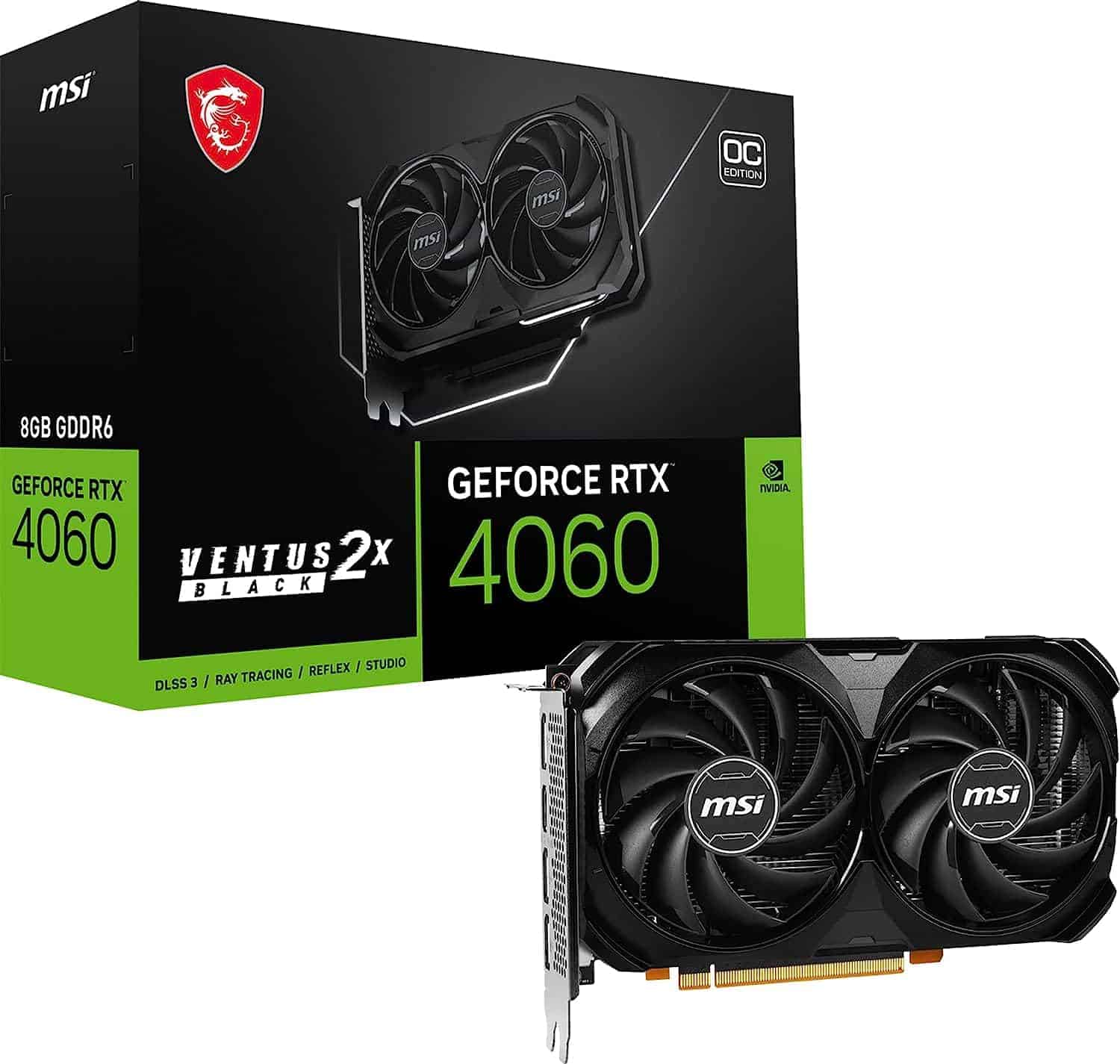You can trust VideoGamer. Our team of gaming experts spend hours testing and reviewing the latest games, to ensure you're reading the most comprehensive guide possible. Rest assured, all imagery and advice is unique and original. Check out how we test and review games here
MSI Gaming GeForce RTX 4060

Base Clock
1830MHz
Boost Clock
2460MHz
VRAM
8GB
Recommended PSU
300W
This is our Nvidia RTX 4060 vs 2070 Super comparison – will Nvidia’s latest graphics card be worth the upgrade?
The launch of the RTX 4060, Nvidia’s 1080p current-gen graphics card has got people wondering whether it’s finally time to upgrade their graphics card. You can find out where to buy the 4060, which has the most affordable MSRP yet for a Nvidia 40-series GPU, costing slightly less than the 4060 Ti. With features like advanced ray tracing features and DLSS 3.0, the 4060 looks like it could be a decent investment in 2023.
But where does that leave the 2070 Super which was released back in 2019? It’s been a fan favourite for all this time, capable of rendering 1440p and even 4K resolution in some games. We’re going to be considering how its clock speed, VRAM, architecture and core count shapes up against the newer 4060 card. While the 4060 has certainly made some strides against the 2070 Super, we’ll address whether it’s really worth upgrading 2023, and whether the 4060 is the budget next-gen graphics card you’ve been waiting for.
RTX 4060 vs 2070 Super – specs comparison
| RTX 4060 specs | RTX 2070 Super | |
| Architecture | Ada (TSMC 4NM) | Turing (TSMC 12NM) |
| CUDA cores | 3,072 | 2,560 |
| Base Clock (MHz) | 1,830 | 1,605 |
| Boost Clock (MHz) | 2,460 | 1,770 |
| Memory | 8GB GDDR6 | 8GB GDDR6 |
| Memory Bus | 128-bit | 256-bit |
| Memory Bandwidth | 272.0GB/s | 448.0 GB/s |
| Total Graphics Power | 110W | 215W |
There are a few things that are clear from just glancing at the specs above. While we can see that the RTX 4060 takes the lead, is it really that much better?
A point of contention for the RTX 4060 has to be its 8GB GDDR6 of VRAM, which is shared with the 2070 Super. Unlike the high-end 40-series models, the 4060 misses out on GDDR6X. Some are rightly concerned by the 4060’s 8GB VRAM, questioning whether it’s good enough for gaming. It should perform fine at 1080p though shouldn’t be your go-to choice for 1440p and certainly not 4K gaming. Compared to the RTX Super’s larger 256-bit memory bus, the RTX 4060 also enjoys the title of the more power-efficient card
If you’re thinking of upgrading to the 4060 from your 2070 Super, the superior clock speed and CUDA core count are also important specs to pay attention to. The 4060’s 3,072 CUDA cores are much less compared to its other 40-series siblings, though they still play an important role in delivering a desirable performance.
RTX 4060 vs 2070 Super – architecture
Architecture is an important determining factor when it comes to comparing GPUs. As the newer GPU, the 4060 has the advantage of fourth generation ray tracing and third generation tensor cores, thanks to its Ada Lovelace architecture. First announced with the RTX 4090, Ada Lovelace is built on a 4NM node that makes for a significantly more power-efficient GPU. The 4060 also has the advantage of DLSS 3, an incredible AI-powered feature that helps maximise the efficiency of your GPU, rendering smoother frame rates and taking some of the pressure off your CPU. At the time of writing, there are now over 30 DLSS 3 enabled games, making the 4060 well worth it if you’re looking to increase your frame rates without investing in entirely new PC parts.
The RTX 2070 Super meanwhile uses Turing architecture on a 12NM node. Released in 2019, this architecture is significantly older than the Ada Lovelace architecture, though still holds its own in most gaming scenarios. Its release gave many Pascal gamers of the previous generation a reason to upgrade. Turing was the first generation of architecture to feature ray tracing support, so it’s fair to say Ada has come a lot further with ray tracing since then.
Overall, the combination of the 4060’s DLSS 3.0 and advanced ray tracing capabilities makes the card worth it over the RTX 2070 Super.
RTX 4060 vs 2070 Super – performance
There’s only so much we can say about the performance of these two cards ahead of the 4060’s release. The 2070 meanwhile, has been out for around four years, meaning we have slightly more to go off.
The 2070 Super can handle 1440p gaming at 144Hz with relative ease, though it depends on what game you play. Of course, there’s always the option to tweak your game settings for more demanding titles. Overall the 2070 Super has remained a popular graphics card for a reason, though its older architecture will likely stop it from seriously competing with the new RTX 4060 if you’re after fourth generation ray tracing and DLSS 3. Indeed, we can’t say for sure what the 4060 performance will be like, though we expecting it to be amongst the best GPUs for 1080p.
RTX 4060 vs 2070 Super – price
Regardless of the specs and benchmarks, price is always going to be a determining factor in your choice of graphics card, especially in markets like these.
MSI Gaming GeForce RTX 4060

Base Clock
1830MHz
Boost Clock
2460MHz
VRAM
8GB
Recommended PSU
300W
The good news is that the 4060 looks like it could be one of the best GPUs under $500 we’ve seen in a while. With an MSRP of $299, which is relatively affordable compared to some of the higher-end 4000 cards. But how does the price tag compare with the 2070 Super?
As you might expect, the 2070 Super has a much lower MSRP of aorund $349, with some selling for as little as $279 at the time of writing via Newegg. While it might be tempting to go for the cheapest graphics card at the moment, we reckon the performance uplift on the 4060 will be worth the extra dollar if you can afford it.
RTX 4060 vs 2070 Super – final word
The RTX 2070 Super remains a massively capable of card in 2023, and the fact that it shares the same amount of VRAM as the 4060 raises some serious questions about whether it will be worth it. However, VRAM isn’t the whole story – you can’t get past the fact that the 4060 offers the immensely powerful DLSS 3.0 feature which will help out any aging PC system. Moreover, its advanced ray tracing features and significantly improved power efficiency is surely enough to warrant an upgrade.






